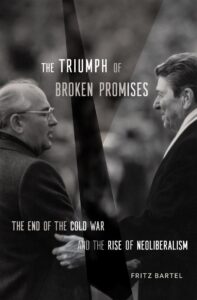§1. In The Triumph of Broken Promises, Fritz Bartel dives into the state documents of the Warsaw Pact countries from 1970s and 1980s. Bartel asks the question of how and why the Cold War came to a peaceful end with the triumph of neoliberalism, and answers this questions based on an empirical study of what the politicians and high-level bureaucrats of the time were discussing among themselves.

The book’s main argument is as follows: By the end of the Second World War, governments on both sides of the Iron Curtain promised to their constituencies that their living conditions would constantly improve. Then the economic shocks of the 1970s forced them to break those promises. Whereas the capitalist countries had a social mechanism (liberal politics and elections) of breaking promises, for the socialist countries breaking promises ended up meaning breaking the entire social contract. The policies that followed were exactly the same. For politicians on both sides of the Iron Curtain, it was crystal clear that they had to implement austerity and market discipline. On the Warsaw Pact side, the politician couldn’t build social consensus around this, which lead their countries to bankrupcy, while the neoliberals managed to force consent from their constituencies.
The Triumph of Broken Promises is an excellent, eye-opening book based on historical documents and produced with a deep commitment to empirical data.
§2. On the other hand, The Triumph of Broken Promises is a history book. How would it interact with of the propositions of All In?
§3. In the 1970, the oil crisis and the rise of the Organization of the Petroleum Exporting Countries (OPEC) sent shockwaves to the global markets. It triggered the aggressive shift to neoliberalism in the United Kingdom and the United States of America. It should therefore affect the rest of the world markets. But why would it cause the downfall of the socialist economies?
The answer is globalization.
The forgotten story here is how much the socialist economies were actually integrated into the world commodity markets. Even though they had non-monetary trade agreements among each other, their budgets still relied on the exchange of commodities with the capitalist world. By the end of 1970s, the Soviet Union had a very valuable commodity, oil, and found itself in a dilemma. Keeping up with the trade agreements with its socialist partners and giving them oil in exchange of other commodities instead of cash was causing a deficit in its economy. This in turn strangled the other Warsaw Pact countries.1
§4. There are many reasons for the dissolution of the Socialist Bloc. However, besides the collapse, the smoothness of the collapse must be explained. Fritz Bartal gives exactly this explanation in The Triumph of Broken Promises by describing how a globalized economy forced a globalizing politics.
This was many decades ago.
We now have a much more globalized context.
The abstraction level in which we propose strategies must correspond to the level in which our problems lie.
One can read The Triumph of Broken Promises as a history book. But if you read it with a lens in search of strategy, you will find quite some interactions with the globalization proposition of All In.
***
Sinan Eden is a co-author of All In.
Footnotes:
1 In the capitalist core, austerity meant inflation. In the socialist economies, it meant shortage. In the capitalist core, commodities existed in the shelves but working people couldn’t buy them. In the socialist core, the shelves were empty (because the promises of the socialist governments implied that if a product existed, then it had to be available to the people).
N.B. These “interaction” articles are book readings with specific angles. We have no intention of summarizing or reviewing the books. Rather, we are exploring interactions between the books’ content (main arguments or minor observations) and the movement-level strategy and organization framework presented in All In.







